Change in Pakistan as women seize right to vote
- Published
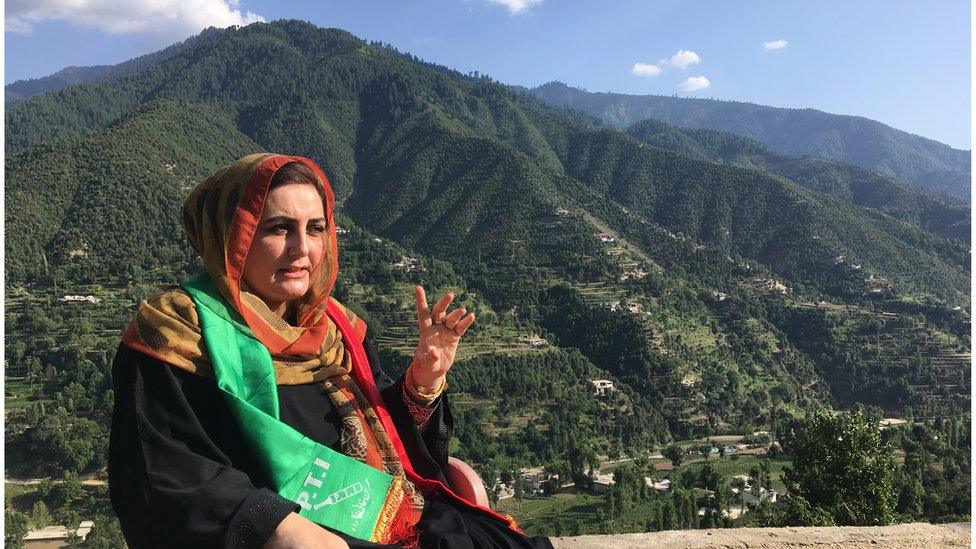
Few could imagine women voting let alone standing for election in this remote area
Hameeda Shahid is making history. She is standing for parliament in a conservative tribal area of Pakistan which borders Afghanistan.
Dir was once a Taliban stronghold where women had few rights and were not even allowed vote.
She is fighting for a seat on former cricketer Imran Khan's party Pakistan Tehreek-e-Insaaf's ticket.
The moment she steps outside her home, men start chanting the slogan "long live PTI". A few schoolboys stop and stare from a distance.
"I thought that if a woman can cast a vote, she can also run for election, it changed my mind," says Hameeda Shahid.
Last year, Pakistan's Election Commission refused to accept council election results in Dir as no woman had voted.
It said at least 10% of voters must be women in each constituency for an election to be valid. Hameeda Shahid seized her chance.
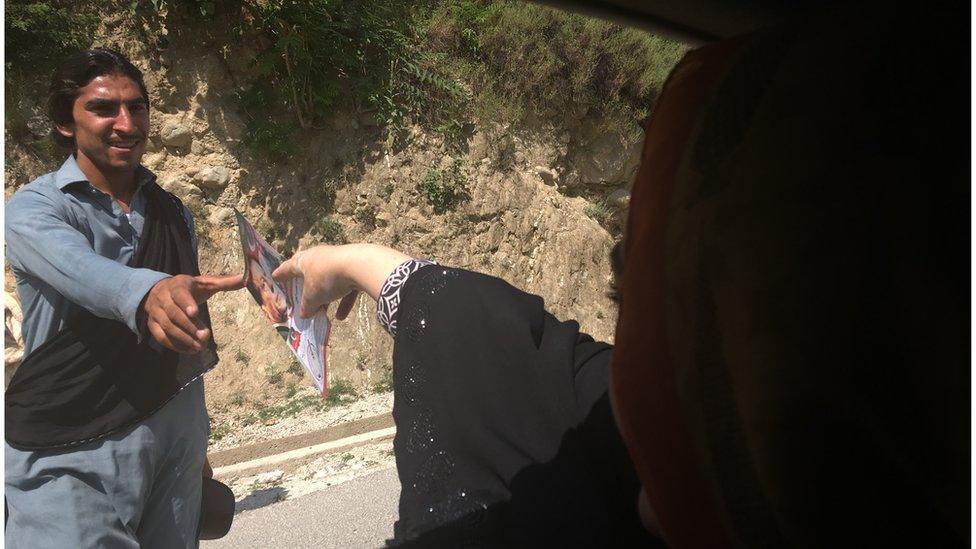
A woman canvassing for votes from men is still a surprising sight
"I am reaching out to women irrespective of their party affiliations and they say that they are going to vote for me," she says.
"They are very happy to get the opportunity to vote and now want me to win a seat in parliament."
It's the first time a woman is contesting an election in Dir and men are still getting used to seeing a woman on the campaign trail.
Hameeda Shahid's male party supporters give her a scarf with PTI colours. She puts it on and is driven away to canvass more votes.
Nationwide problem
But it's not just in remote and far flung areas like Dir where women are barred from voting.
It happens across the country, even in Punjab which is Pakistan's most developed province.
Women have had the right to vote since the foundation of the state but being able to use it is a different story.
Just 150km away from the capital Islamabad lies Dhurnal village which has a long history of barring women from voting.
On polling day in 1962, a row broke out involving women.
Since many men in Pakistan believe that women embody their honour, the village men felt insulted and banned women from voting.
More than half a century later, the ban still persists.
Dhurnal is a scenic farming town home to around 15,000 people. It's famous for its peanut crop.
The houses are large, made of cement and bricks. There's a higher literacy rate here than in your average farming village.

Even women in prosperous areas must fight to reclaim their democratic right
Everybody seems to be going out their business but when I meet a young woman who wants to vote, I can sense her tension.
The social pressure is so strong that the young woman doesn't want to reveal her identity. We have changed her name to Iram for this article.
"In my life I have never seen any woman voting. The men of our village don't like to send their women to polling stations, it has almost become a tradition," says Iram, her face covered with a veil and her eyes just visible.
"And there is not a single man strong enough to take a stand and let women from his family cast a ballot because he has to survive in this society too."
Women organising
This explains why not a single woman voted in 17 polling stations in the previous election but Iram is determined to change things.
She is working with a local NGO and has secretly gathered a group of around a dozen women at her house to discuss the importance of voting.
Naheeda Abbasi is the regional manager for the Potohar Organisation for Development and Advocacy.
She says she has spent the past 10 years trying to persuade village men to let women vote but has hit a brick wall.
Even getting access to the women in this conservative village is a challenge so Iram is helping her.
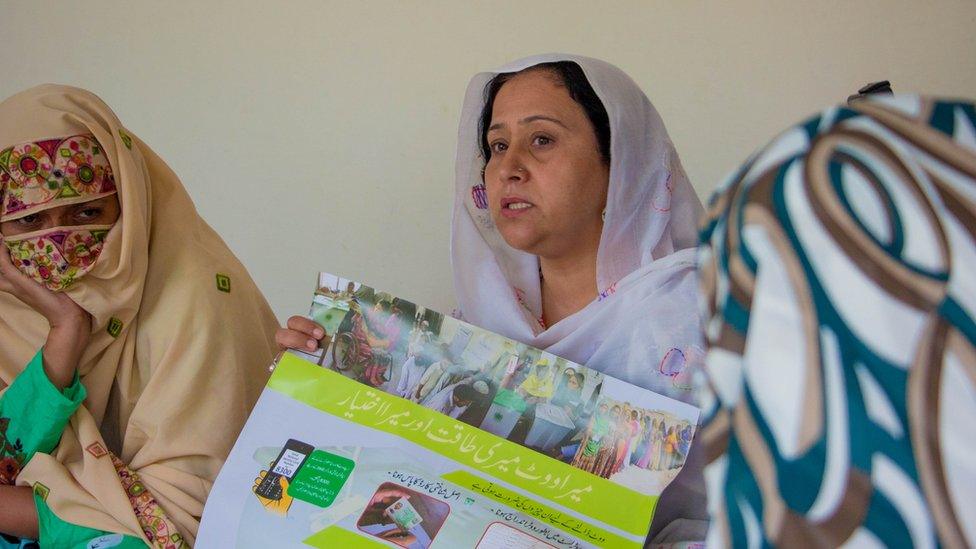
Ten years of campaigning is finally bearing fruit for activist Naheeda Abbasi
Naheeda Abbasi holds a banner which reads "The vote is your power, your future depends on it" as she explains the electoral process to the gathered women.
One of the veiled women challenges her.
"All our needs are honourably met. Men say we don't have to go out and get disgraced," says the woman.
"With so many men hanging out at polling stations on election day, we'd be better staying at home."
Naheeda Abbasi listens intently and tells her that the Election Commission will set up separate polling stations for women in conservative areas like Dhurnal.
"Women in Dhurnal neither have political awareness nor any knowledge about voting," she says.
"They have always been kept away from it. Village men and candidates decide that they don't need women's votes, so the candidates don't reach out to them."
Men only
In a nearby mosque, cleric Qazi Hafeez Ali is leading prayers. He has a huge influence on village men.
The imam denies the existence of a ban - despite women on the ground describing a very different situation.

Men are used to 'owning' the electoral process in Dhurnal
"No one has ever stopped them from casting votes. There was a dispute in the past," he says.
"We have lots of fights in this village and most of the time the root cause is women. So people are scared of allowing women to vote but now the situation is changing."
I attend a rally for Ammar Yasir who is running for a seat in parliament for former cricketer Imran Khan's party. It's a sea of men.
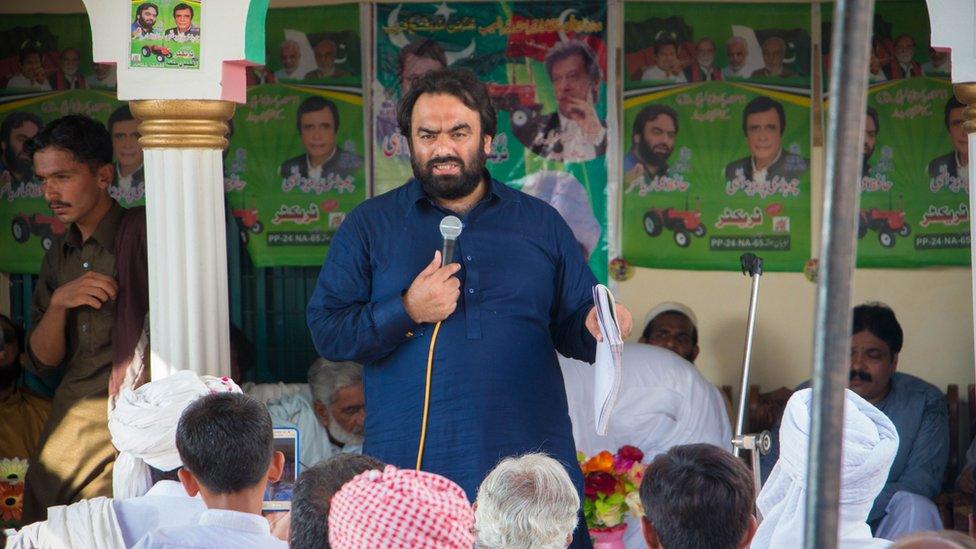
Election candidate Ammar Yasir says he is trying to get the ban lifted
He says he doesn't support the ban on women voting yet none of the candidates has done anything to change it.
"I have visited the areas where women are banned from voting and I am in touch with the local elders. They are reviewing it," says Ammar Yasir.
Time to act
If the women were waiting for the men to act, they would still be denied their right.
It's the Election Commission which has sought to put women at the heart of the campaign.
Last year, it brought in a rule where 10% of women had to vote in a constituency for the vote to be valid.
And in the run up to the 25 July general election, it has embarked on a major registration drive.
An extra three million women can now vote though it estimates there are still more than nine million women without a ballot.
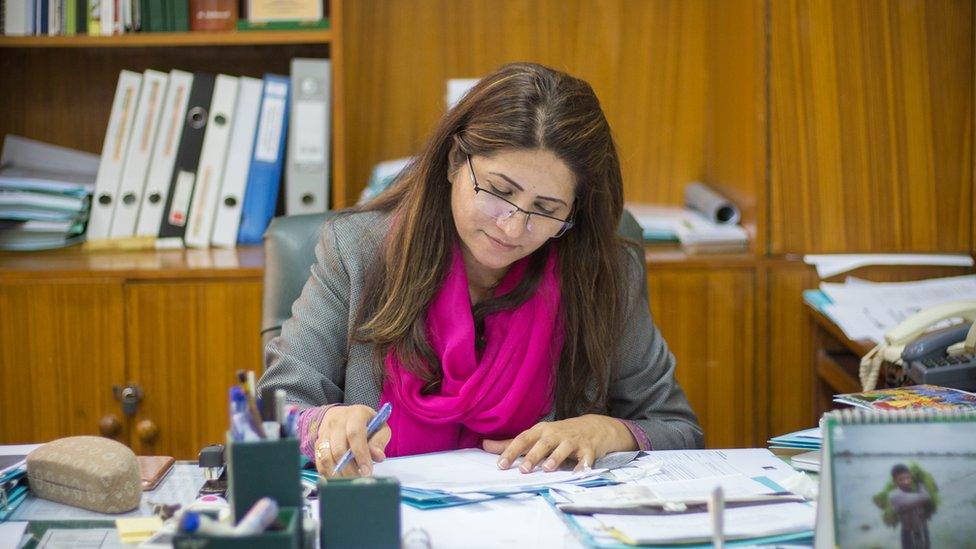
Pakistan's Election Commission has forced change in a male-dominated society
"[The] realisation has set in where women also are coming forward and they also want to participate," says Nighat Sidiq, director of the Gender Affairs department at the Election Commission.
"We have been trying to sensitise women, and also men of those areas, and we are very positive that we will not declare the result until we have 10%. We will go for re-poll."
Women activists across the country have campaigned for years to overcome such barriers. Now there is hope in the air that women and their vote can no longer be ignored.


What is 100 Women?
BBC 100 Women names 100 influential and inspirational women around the world every year. We create documentaries, features and interviews about their lives, giving more space for stories that put women at the centre.
Follow BBC 100 Women on Instagram, external and Facebook , externaland join the conversation.